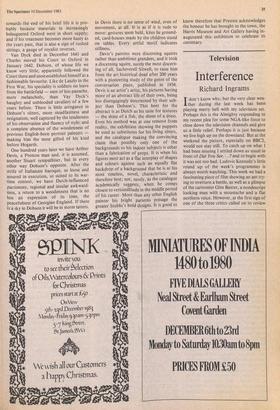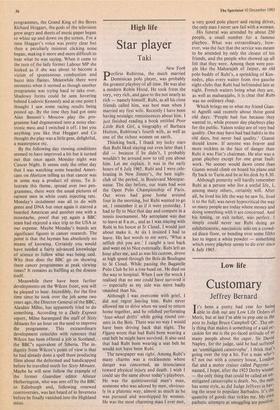Television
Interference
Richard Ingrams
T don't know why, but the very clear wea- 1 ther during the last week has been playing merry hell with my television set. Perhaps this is the Almighty responding to my recent plea for some NGA-like force to close down the television channels and give us a little relief. Perhaps it is just because we live high up on the downland. But at the weekend the picture, especially on BBC2, would not stay still. To catch up on what I had been missing I settled down as usual in front of Did You See. . . ?and to begin with it was not too bad. Ludovic Kennedy's little round up of the week's programmes is always worth watching. This week we had a fascinating piece of film showing an ant try- ing to overturn a beetle, as well as a glimpse of the cartoonist Glen Baxter, a nondescript looking man with a moustache and a flat northern voice. However, at the first sign of one of the three critics called on to review programmes, the Grand King of the Bores Richard Hoggart, thelods of the television grew angry and sheets of music paper began to whizz up and down on the screen. For a time Hoggart's voice was pretty clear but then a peculiarly insistent clicking noise began, making it more and more difficult to hear what he was saying. When it came to the turn of the lady former Labour MP she looked as if she was about to become a victim of spontaneous combustion and burst into flames. Meanwhile there were moments when it seemed as though another programme was trying hard to take over. Shadowy forms could be seen hovering behind Ludovic Kennedy and at one point I thought I saw some racing results being posted up. By the time they had got onto Alan Bennett's Moscow play the pro- gramme had degenerated into a noisy elec- tronic mess and I switched it off. 1 bet you anything you like that Hoggart and Co thought the play was a little gem, delightful, a masterpiece etc.
By the following day viewing conditions seemed to have improved a bit but it turned out that once again Monday night was Cancer Night. It seems only the other day that I was watching some bearded Ameri- cans on Horizon telling us that cancer was in some way a product of stress. To il- lustrate this theme, spread over two pro- grammes, there were the usual pictures of earnest men in white coats injecting rats. Monday's instalment was all to do with genes and DNA but once again it starred a bearded American and another one with a moustache, proof that yet again a BBC team had enjoyed a nice trip to the USA at our expense. Maybe Monday's beards are significant figures in cancer research. The point is that the layman has absolutely no means of knowing. Certainly you would have needed a fairly advanced knowledge of science to follow what was being said. Why then does the BBC go on showing these cancer programmes at peak viewing times? It remains as baffling as the disease itself.
Meanwhile there have been further developments on the Wilcox front, you will be pleased to hear. Incredibly, for the first time since he took over the job some two years ago, the Director General of the BBC, Alasdair Milne, has apparently tried to do something. According to a Daily Express report, Milne harangued the staff of Sixty Minutes for an hour on the need to improve the programme. This extraordinary development coincides with rumours that Wilcox has been offered a job in Scotland, the BBC's equivalent of Siberia. The in- dignity from Wilcox's point of view is that he had already done a spell there producing films about the deformed and handicapped before he travelled south for Sixty Minutes. Maybe he will now follow the example of the former Guardian editor Alistair Hetherington, who was sent off by the BBC to Edinburgh and, following renewed controversies, was last heard of in Inverness before he finally vanished into the Highland mists.















































 Previous page
Previous page